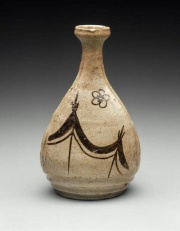Difference between revisions of "Ash (residue)"
Jump to navigation
Jump to search
(username removed) |
|||
| (2 intermediate revisions by 2 users not shown) | |||
| Line 1: | Line 1: | ||
| − | [[File:92.5425-SC23766.jpg|thumb|]] | + | [[File:92.5425-SC23766.jpg|thumb|Sake bottle<br>MFA# 92.5425]] |
== Description == | == Description == | ||
| − | A grayish white to black powdery residue that remains after a substance has burned. The residual ash is composed of noncombustible, or mineral, matter such as [ | + | A grayish white to black powdery residue that remains after a substance has burned. The residual ash is composed of noncombustible, or mineral, matter such as [[silica|silica]], [[alumina|alumina]], [[iron%20oxide%20red|iron oxide]], [[clay|clay]], etc. Ash from plant material generally contains high amounts of [[lime|lime]], [[sodium%20carbonate|sodium carbonate]], and/or [[potassium%20carbonate|potassium carbonate]]. Wood ash was the principal source for potassium for several hundred years. Phosphorus was obtained from the ash of animal bones ([[calcium%20phosphate|calcium phosphate]]). Ash from sea plants contains high amounts of [[iodine|iodine]]. |
[[File:Ash.quarry.jpg|thumb|Ash Quarry]] | [[File:Ash.quarry.jpg|thumb|Ash Quarry]] | ||
| + | |||
== Synonyms and Related Terms == | == Synonyms and Related Terms == | ||
wood ash; bone ash | wood ash; bone ash | ||
| − | + | ==Physical and Chemical Properties== | |
{| class="wikitable" | {| class="wikitable" | ||
|- | |- | ||
| Line 23: | Line 24: | ||
</gallery> | </gallery> | ||
| − | + | ==Resources and Citations== | |
| − | == | ||
* Richard S. Lewis, ''Hawley's Condensed Chemical Dictionary'', Van Nostrand Reinhold, New York, 10th ed., 1993 | * Richard S. Lewis, ''Hawley's Condensed Chemical Dictionary'', Van Nostrand Reinhold, New York, 10th ed., 1993 | ||
Latest revision as of 13:36, 30 April 2022
Description
A grayish white to black powdery residue that remains after a substance has burned. The residual ash is composed of noncombustible, or mineral, matter such as Silica, Alumina, iron oxide, Clay, etc. Ash from plant material generally contains high amounts of Lime, Sodium carbonate, and/or Potassium carbonate. Wood ash was the principal source for potassium for several hundred years. Phosphorus was obtained from the ash of animal bones (Calcium phosphate). Ash from sea plants contains high amounts of Iodine.
Synonyms and Related Terms
wood ash; bone ash
Physical and Chemical Properties
| Density | 40-53 pcf |
|---|
Additional Images
Resources and Citations
- Richard S. Lewis, Hawley's Condensed Chemical Dictionary, Van Nostrand Reinhold, New York, 10th ed., 1993
- Boise Cascade Paper Group, The Paper Handbook, Boise Cascade, Portland OR, 1989
- Matt Roberts, Don Etherington, Bookbinding and the Conservation of Books: a Dictionary of Descriptive Terminology, U.S. Government Printing Office, Washington DC, 1982
- Artists' Pigments: A Handbook of their History and Characteristics, Ashok Roy (ed.), National Gallery of Art, Washington DC, Vol. 2, 1993
- The Dictionary of Paper, American Paper Institute, New York, Fourth Edition, 1980
- Bernard Toale, The Art of Papermaking, Davis Publications, Portland OR, 1983
- Random House, Webster's Encyclopedic Unabridged Dictionary of the English Language, Grammercy Book, New York, 1997
- The American Heritage Dictionary or Encarta, via Microsoft Bookshelf 98, Microsoft Corp., 1998




